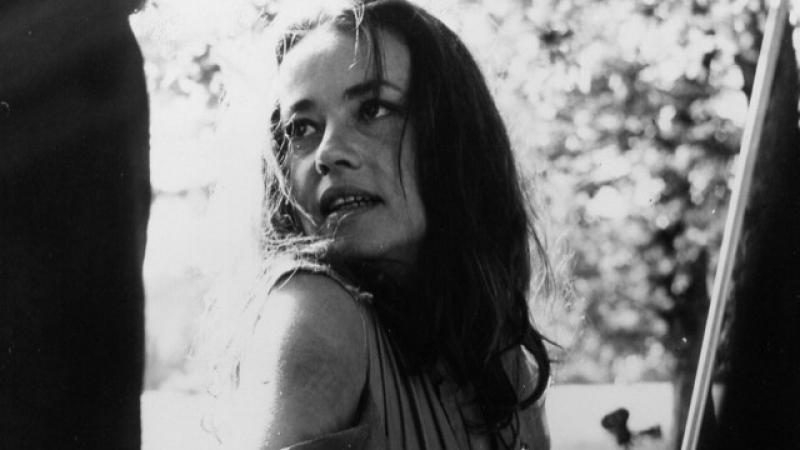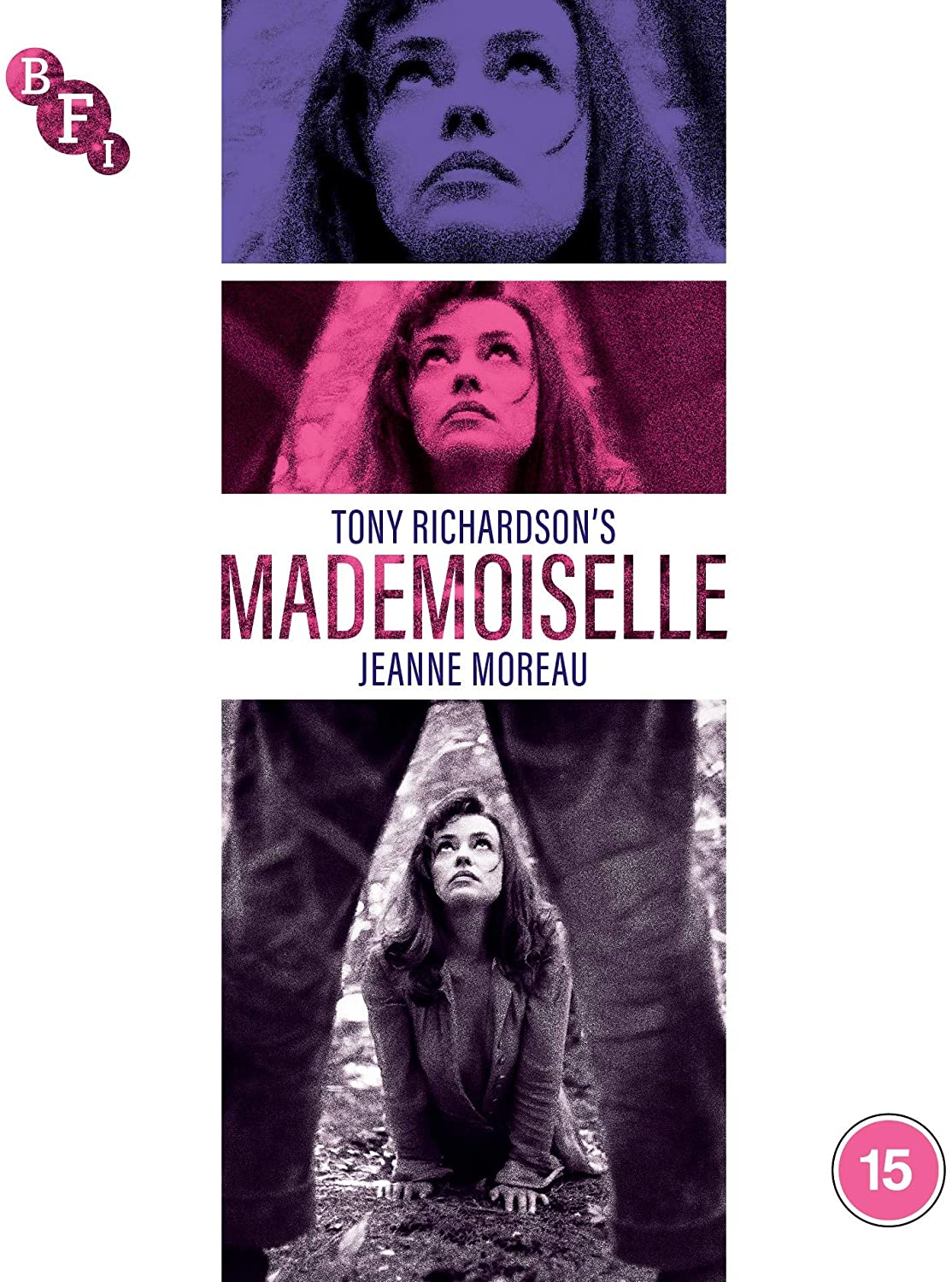DVD/Blu-ray: Mademoiselle | reviews, news & interviews
DVD/Blu-ray: Mademoiselle
DVD/Blu-ray: Mademoiselle
Jeanne Moreau's star quality fails to save movie from cliché

Mademoiselle is Jeanne Moreau, in smouldering femme fatale mode: a school-teacher and town hall secretary in a small French village, she wreaks havoc by setting fire to barns, poisoning cattle and unleashing flood waters in a farm yard full of animals.
Tony Richardson’s 1966 movie never quite rises beyond the constraints of an excessively unsubtle screenplay, based on a story by Jean Genet – a writer not know for holding back. The story might have had potential but feeds on cliché rather than rich or complex human psychology. As a document of the 1960s, when cinema was exploring the boundaries of what was permitted in cinema, the film has a certain value. In itself, however, it’s a dud – predictable and mostly boring, with a reliance on a bunch of ready-made and lifeless symbols, all of which are connected to sex: fire, gushing water, a wriggling snake, axes swung by the men of the woods.
 Moreau plays the village psychopath – a disturbed being in bourgeois clothing – very well. Her narcissistic play with costume, stiletto heels, and a flouncing gait are good enough but predictable. Some of the erotic play between her and the macho Italian works well. She’s beautifully filmed by director of photography David Watkin, who was no doubt encouraged by Tony Richardson’s British New Wave cinema love affair with rough visual edges and an apparent spontaneity.
Moreau plays the village psychopath – a disturbed being in bourgeois clothing – very well. Her narcissistic play with costume, stiletto heels, and a flouncing gait are good enough but predictable. Some of the erotic play between her and the macho Italian works well. She’s beautifully filmed by director of photography David Watkin, who was no doubt encouraged by Tony Richardson’s British New Wave cinema love affair with rough visual edges and an apparent spontaneity.
For all the attempts at high drama, the film doesn’t hold up as a convincing whole. The psychological dynamics aspire towards the logic of tragedy, and yet eschew the basic rules. The fact that at least four writers worked on the script suggests that there may have been something intractable about the story itself, or just a mismatch of talents. The film’s credibility is hardly helped by an inconsistent approach to language and sub-titles: The villagers, the police and "Mademoiselle" speak English, thankfully without a hint of an ’Allo ‘Allo French accent. Some of the village dialogue is in French, and the Italian woodman, his mate and his son speak Italian. This is an arthouse film, and we are used to watching Godard, Truffaut or Chabrol movies from the 1960s in French. The English-speaking peasants never quite ring true.
The bonuses on this BFI release are nothing special: an interview with Keith Skinner, who plays Bruno, the woodcutter's son, shares some anecdotes about casting ansd shoot, and an audio commentary from Adrian Martin. Though those curious about oddities from the early 80s may enjoy a look at Jan Worth's part-doc/part-fiction indie feature Doll's Eye (1982), an idiosyncratic and misguided exploration of men's attitudes to women,
If you're a Jeanne Moreau fan – and aren’t we all? – the film is worth watching as she fills the screen with erotic power as very few others do. It's easy to imagine Isabelle Huppert in a similar role, but she doesn’t ooze the same sensuality as the older actress. Moreau is a joy to watch. Such a pity that the film itself isn’t up to the quality of her performance.
rating
Explore topics
Share this article
Add comment
The future of Arts Journalism
You can stop theartsdesk.com closing!
We urgently need financing to survive. Our fundraising drive has thus far raised £49,000 but we need to reach £100,000 or we will be forced to close. Please contribute here: https://gofund.me/c3f6033d
And if you can forward this information to anyone who might assist, we’d be grateful.

Subscribe to theartsdesk.com
Thank you for continuing to read our work on theartsdesk.com. For unlimited access to every article in its entirety, including our archive of more than 15,000 pieces, we're asking for £5 per month or £40 per year. We feel it's a very good deal, and hope you do too.
To take a subscription now simply click here.
And if you're looking for that extra gift for a friend or family member, why not treat them to a theartsdesk.com gift subscription?
more Film
 The Kingdom review - coming of age as the body count rises
A teen belatedly bonds with her mysterious dad in an unflinching Corsican mob drama
The Kingdom review - coming of age as the body count rises
A teen belatedly bonds with her mysterious dad in an unflinching Corsican mob drama
 Weapons review - suffer the children
'Barbarian' follow-up hiply riffs on ancient fears
Weapons review - suffer the children
'Barbarian' follow-up hiply riffs on ancient fears
 theartsdesk Q&A: filmmaker Dag Johan Haugerud on sex, love, and confusion in the modern world
The writer-director discusses first-love agony and ecstasy in 'Dreams', the opening UK installment of his 'Oslo Stories' trilogy
theartsdesk Q&A: filmmaker Dag Johan Haugerud on sex, love, and confusion in the modern world
The writer-director discusses first-love agony and ecstasy in 'Dreams', the opening UK installment of his 'Oslo Stories' trilogy
 Oslo Stories Trilogy: Dreams review - love lessons
First love's bliss begins a utopian city symphony
Oslo Stories Trilogy: Dreams review - love lessons
First love's bliss begins a utopian city symphony
 Blu-ray: Two Way Stretch / Heavens Above!
'Peak Sellers': two gems from a great comic actor in his prime
Blu-ray: Two Way Stretch / Heavens Above!
'Peak Sellers': two gems from a great comic actor in his prime
 Late Shift review - life and death in an understaffed Swiss hospital
Petra Volpe directs Leonie Benesch in a compelling medical drama
Late Shift review - life and death in an understaffed Swiss hospital
Petra Volpe directs Leonie Benesch in a compelling medical drama
 The Naked Gun review - farce, slapstick and crass stupidity
Pamela Anderson and Liam Neeson put a retro spin on the Police Squad files
The Naked Gun review - farce, slapstick and crass stupidity
Pamela Anderson and Liam Neeson put a retro spin on the Police Squad files
 theartsdesk Q&A: actor Lars Eidinger on 'Dying' and loving the second half of life
The German star talks about playing the director's alter ego in a tormented family drama
theartsdesk Q&A: actor Lars Eidinger on 'Dying' and loving the second half of life
The German star talks about playing the director's alter ego in a tormented family drama
 The Fantastic Four: First Steps review - innocence regained
Marvel's original super-group return to fun, idealistic first principles
The Fantastic Four: First Steps review - innocence regained
Marvel's original super-group return to fun, idealistic first principles
 Dying review - they fuck you up, your mum and dad
Family dysfunction is at the heart of a quietly mesmerising German drama
Dying review - they fuck you up, your mum and dad
Family dysfunction is at the heart of a quietly mesmerising German drama
 theartsdesk Q&A: director Athina Rachel Tsangari on her brooding new film 'Harvest'
The Greek filmmaker talks about adapting Jim Crace's novel and putting the mercurial Caleb Landry Jones centre stage
theartsdesk Q&A: director Athina Rachel Tsangari on her brooding new film 'Harvest'
The Greek filmmaker talks about adapting Jim Crace's novel and putting the mercurial Caleb Landry Jones centre stage
 Blu-ray: The Rebel / The Punch and Judy Man
Tony Hancock's two film outings, newly remastered
Blu-ray: The Rebel / The Punch and Judy Man
Tony Hancock's two film outings, newly remastered

Comments
Yes truly a dud that I